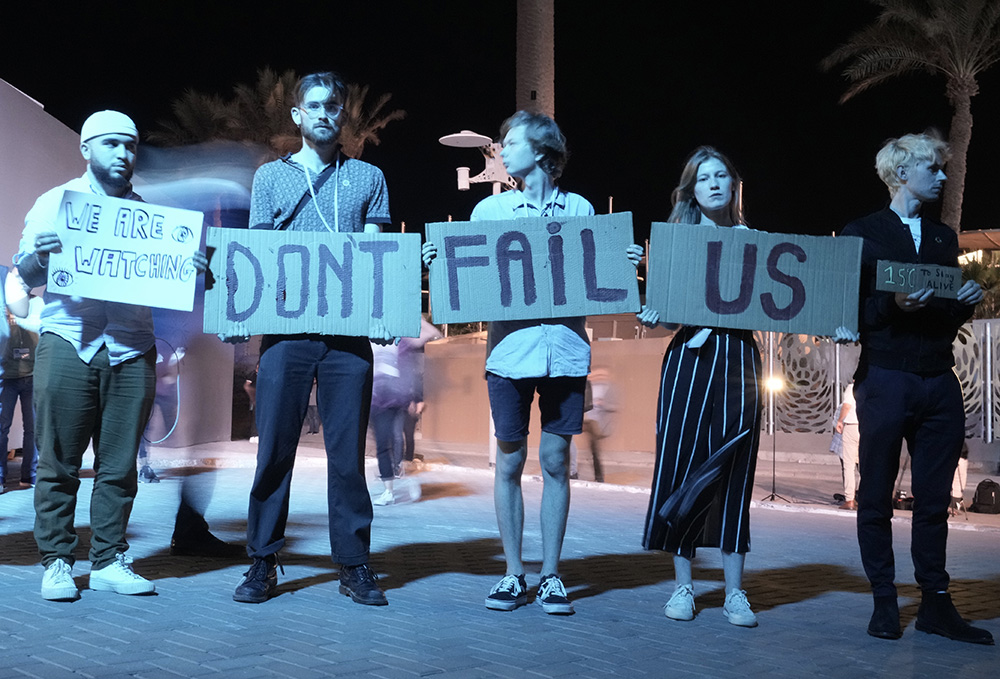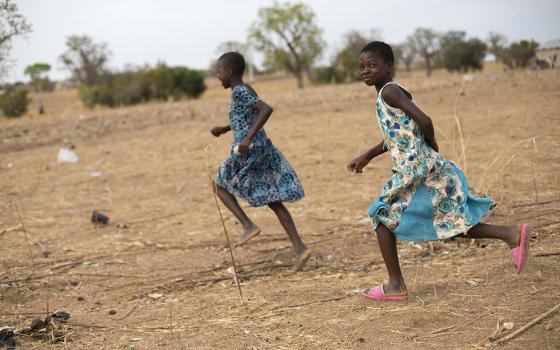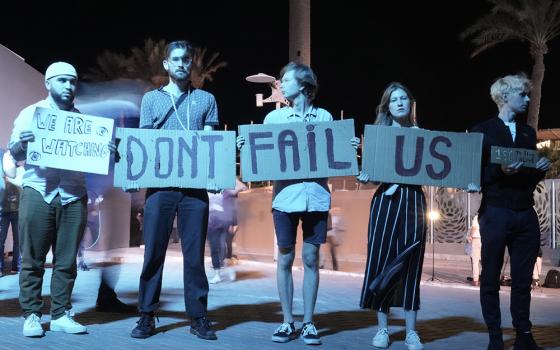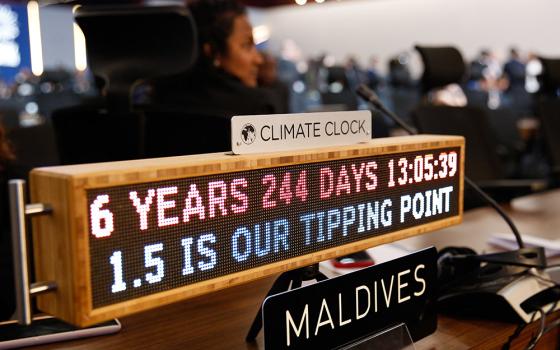
Activists hold signs at the COP27 U.N. Climate Summit on Nov. 19 in Sharm el-Sheikh, Egypt. (AP/Nariman El-Mofty)
Days before the end of COP27, the United Nations climate change conference held in Sharm el-Sheikh, Egypt, in November, Catholic and Ukrainian activist Svitlana Romanko, the former zero fossil fuels campaign manager with the Laudato Si' Movement, tweeted about being forcibly removed from a COP27 event for speaking truth about fossil fuels.
Romanko's unwelcome proclamation was twofold: Fossil fuels are killing Ukrainians by funding war in her home country and killing a climate that is sustainable to life on Earth. There is no denying it — one way or another, fossil fuels lead to death.
The dismissal of the activist and environmental lawyer from the U.N. meeting room turned out to be a foreshadowing of what world leaders would do days later as they composed the Sharm el-Sheikh Implementation Plan agreed to on Nov. 20. With the chance to act on ever-louder calls to phase out fossil fuels, and with it emphasize the urgency of a clean energy transition, they instead dismissed the proposal of a future free of fossil fuels (one backed by India, the U.S. and EU) and agreed only to phase down the use of coal, repeating a commitment from COP26 in Glasgow.
Reportedly, the scale-back on ditching fossil fuels was a compromise for the establishment of a loss and damage fund to compensate the most vulnerable countries impacted by climate change. The creation of a fund for loss and damage is monumental — they have been talking about doing it for three decades — and the compensation it could provide is a critical component to the restorative justice needed in regard to how climate change affects different parts of the world and who is culpable for that damage. However, one has to wonder about the long-term implications of such a tradeoff.
The planet has already heated approximately 1.1 degrees Celsius above preindustrial levels. Under current national climate pledges being implemented, we're on track to heat 2.5 C by the end of the century. Surpassing the Paris Agreement's limit of heating 1.5 C will result in irreversible and catastrophic changes to our world that will make now-populated places uninhabitable for human life.
Advertisement
Can a loss and damage fund help with this dystopian future? Maybe. But with important details like how much money will be in the fund, who will contribute and who is eligible for withdrawals yet to be determined (specifics that could take years to decide), we can't yet know if this landmark decision will indeed provide the life raft vulnerable communities so desperately need to reach safe shores, or if it will merely keep them adrift for a bit longer on waters that continue to rise because we're not doing enough to stop them.
With a loss and damage fund, "we can cure the symptoms but not address the causes," Comboni Missionary Sr. Paola Moggi said during a debriefing webinar Nov. 22 hosted by the International Union of Superiors General. Moggi attended COP27 on behalf of the faith-based nongovernmental organization VIVAT International.
This is indeed a situation that calls for that great Catholic both/and approach. We need to both aid vulnerable communities with compensation for decades of loss and damage that climate change has already wrought, and stop the ongoing destruction at the source by divesting from and phasing out use of coal, oil and gas.
The week before COP27, 50 religious institutions, representing millions of members worldwide, joined in promoting a global treaty to end the use of fossil fuels and ensure a "just transition" to renewable energy. Cardinal Michael Czerny, head of the Vatican Dicastery for Promoting Integral Human Development, threw his support behind the proposal last summer as the Vatican announced it would become a formal party to the U.N. Framework Convention on Climate Change and the Paris Agreement.
These are examples of how important climate justice should be to people of faith. It is a nonnegotiable.
Yet leaders throughout the world, including church leaders, are failing to lead. Despite having the truth about fossil fuels shouted, presented, taught and otherwise made very clear to them throughout the two-week climate conference and the decades that preceded it, the negotiators in the room at COP27 chose to remain attentive to the influence of the fossil fuel industry — which had more than 600 lobbyists at the conference — and to a political culture of instant gratification, more concerned about today's gas prices than ongoing planetary destruction.
Instead of listening to the cries of the poor, their voices have been ignored once again.






